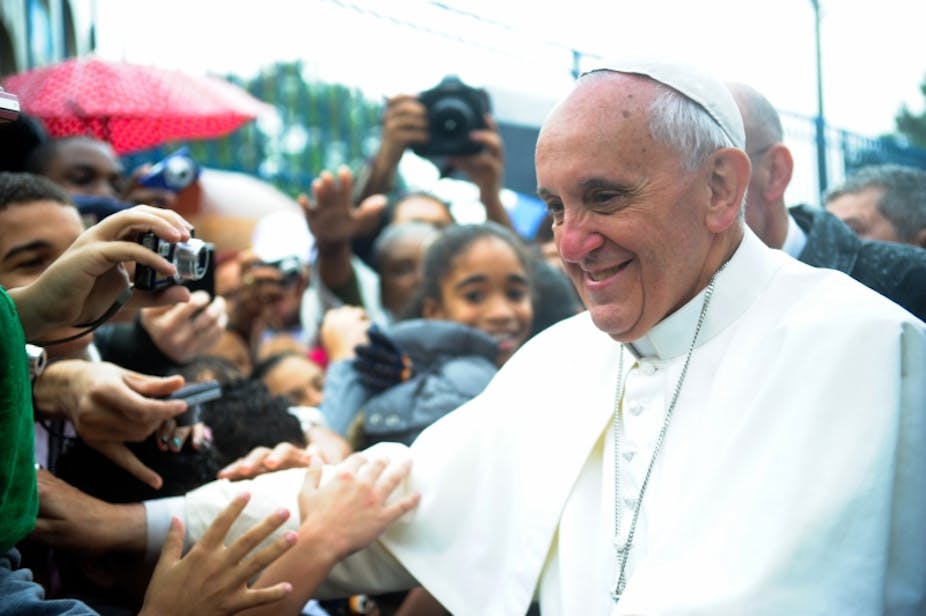Pope Francis has been named Time Magazine’s Person of the Year for “pulling the papacy out of the palace and into the streets”. He beat nine others including NSA whistleblower Edward Snowden and Bashar al-Assad.
Time magazine chooses its person of the year on the basis of impact. The award is given to the person who has had the most impact during the year, for better or worse.
According to managing editor Nancy Gibbs Francis is “a new voice of conscience” who has drawn comparison to both Martin Luther King Jnr and Karl Marx. He has “placed himself at the very centre of the central conversations of our time: about wealth and poverty, fairness and justice, transparency, modernity, globalisation, the role of women, the nature of marriage, the temptations of power”.
Francis has changed the style and ethos of the papacy, in a way which has inspired many outside and inside the church. While our politicians promote a culture of corporate greed, preaching austerity to the poor and dismantling the welfare state, Francis envisions a just society based on the dignity and solidarity of every human being, with a special concern for the poor and the marginalised.
He is compared to Pope John XXIII (winner in 1962), who initiated the Second Vatican Council. Pope John Paul II (winner in 1994) and Pope Benedict XVI attempted to halt the changes sweeping through the postconciliar church, but Francis has once again “thrown open the windows” (to use John XXIII’s expression), to let in the winds of change.
Repeating tradition
Many liberal Catholics are euphoric, but others are wary. As a prominent Catholic commentator told me privately, referring to Francis’s Argentinian background: “When Peronists indicate left, they usually turn right”. There have been dismayed mutterings on the conservative blogosphere as to whether the Pope is really a Catholic. These are people for whom being Catholic means rigid conformity to church teachings on gender and sexual ethics. The influence they enjoyed under John Paul II and Benedict XVI is unlikely to continue under Francis, who has made clear his impatience with those who put moral absolutes before the love and mercy of God.

Francis’s recently-published apostolic exhortation Evangelii Gaudium (the Joy of the Gospel), has attracted widespread media coverage because of its condemnation of the “tyranny” of the financial system. In language that resonates with that of Latin American liberation theologians of the 1970s, he refers to the “deified market”, and “the new idolatry of money”.
However, he is largely repeating traditional church teaching about the just distribution of resources and, more recently, about the principles of solidarity and subsidiarity, which are central tenets of Catholic social teaching. The difference is more in style and emphasis than in substance. To quote Gibbs, “he has not changed the words, but he’s changed the music”.
The main focus of Evangelii Gaudium is not economics. It is to remind Catholics of their vocation to evangelisation and mission, based not on conformity to rules and rituals but on the joy and hope of faith. It is pastoral in style with many touches of affection and wit, but it is has harsh words to say about clericalism and elites within the church.
He’s no liberal
Nevertheless, it is misleading to describe this as liberalism. Francis reiterates that the ordination of women is not open to discussion, and we must wait to see how committed he is to his expressed desire to promote women to roles of leadership in the church. While he makes no reference to homosexuality or contraception, he affirms the church’s opposition to abortion, albeit in pastoral terms which acknowledge the need to reach out to women struggling with unwanted pregnancies. Perhaps he appears liberal because his two conservative predecessors sought to exercise such a monopoly of power.
Yet there is a paradox here. Francis seeks to diminish the power of the papacy and to introduce a model of consultation and dialogue within the church. However, he has rapidly acquired superstar status. He risks becoming the victim of his own success, if he fuels a papal personality cult which many believe was John Paul II’s downfall.
Vatican spokesman Federico Lombardi said of the Time announcement that the Pope was not seeking fame, but: “If it attracts men and women and gives them hope, the Pope is happy.” I doubt if this dubious honour will go to Francis’s head. After all, previous recipients included Adolf Hitler, Josef Stalin (twice), nearly every American president, and even “the computer”. Like The Guardian, I would have chosen Edward Snowden, as someone whose courageous action has had a far-reaching impact on all our lives. Or, if we are talking about impact in terms of devastation and destruction, Bashar al-Assad had no peers in 2013.
But perhaps the choice of Francis expresses something similar to the eulogies surrounding the death of Nelson Mandela. They bear witness to our deep human longing for justice and solidarity. For all our cynicism and disillusionment, they remind us that we are a noble species and we can do better than this. Such people are not idols to be worshipped, but examples to be followed.

